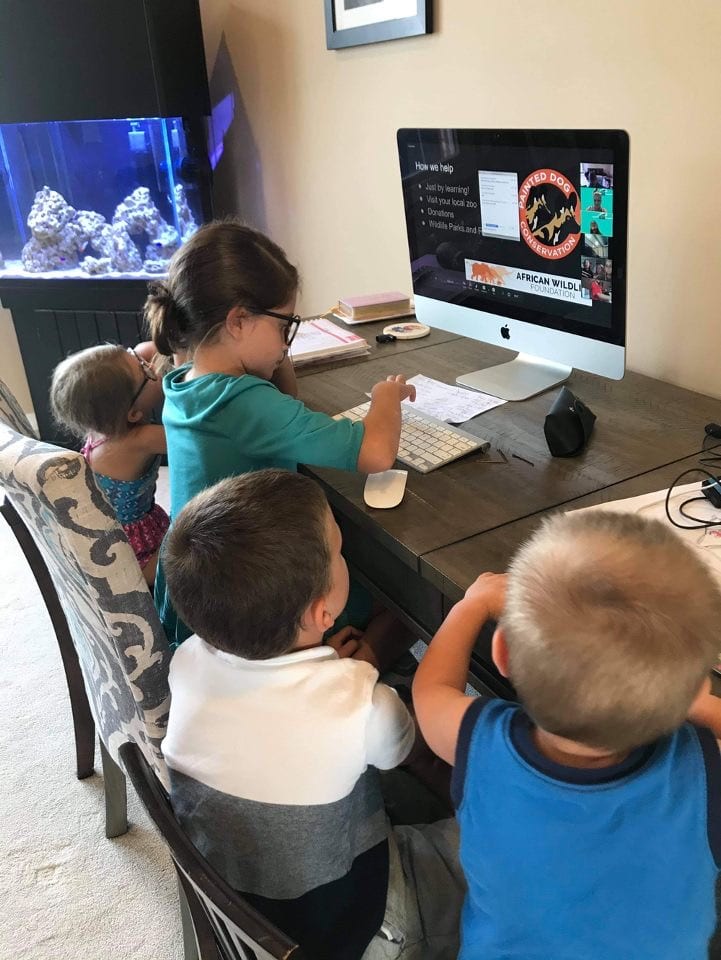
Sophomore Maddie Ketner, animal studies and psychology major, presents on WILDWebinars.
When the world screeched to a halt in 2020, Assistant Professor of Animal Studies Erin Frick wondered how young children would continue to get their engagement and learning opportunities.
“Old friends and colleagues usually teach at afterschool programs and summer camps about animals, but now many of those programs would have to go virtual,” Frick said.
Afraid youngsters would miss those enrichment courses, the student members of the Animal Studies Research Collaborative at Eckerd College expressed interest in hosting their own virtual programs to help children quarantining at home.
Since June 2020, more than 12 Eckerd students have presented a bevy of animals to enthusiastic groups of elementary schoolers on WILDWebinars, a biweekly live Zoom presentation that invites anyone to come and learn the basics of a particular animal, including facts about their lives in the wild.
Interested students or parents can sign up for email alerts about upcoming webinars and receive link information via email prior to the date of the presentation. Each featured animal is highlighted through a slideshow and worksheets during a Zoom meeting, and inquisitive kids are encouraged to ask their burning questions at the end.
“Kids have some of the strangest questions that you can think of, like, ‘Do they have friends?’ or ‘Do they play with toys?’” said Victoria Brown, a junior animal studies and psychology student from Downers Grove, Illinois. “We try to prepare for most of them.”
Frick said each presenter chooses their own animal and is encouraged to make a worksheet with questions and coloring pages for children to complete at home. Presenters craft their own slideshow through research. Students who work in research labs across campus have teamed with WILDWebinars to show off their subject knowledge—from gopher tortoises to horseshoe crabs.
“I review the presentations and help run the Zoom meetings. They will provide some introductory life-history information, but we like to focus more on animal behavior so that people can get an idea of what their daily lives are like,” Frick explained.
Frick said she believes one of the best things about WILDWebinars is that it allows Eckerd students to practice engaging in conversations about animals with kids and the public, which is experience that directly helps them build their resume and makes them a stronger candidate for internships and jobs down the road.

Elementary school aged children from across the country have been participating in Eckerd-student led WILDWebinars since last summer.

Katie Willgohs presents the Amazon river dolphin on WILDWebinars.
Madison “Sonny” Schoenhoft, a junior animal studies and psychology major from Cary, Illinois, has presented African wild dogs, otters, spiders, snakes and wolves to the group—as well as the fossa, a cat-like carnivore that children immediately recognized as the villain from the Madagascar movie. Participants are encouraged to recommend animals, and sometimes presenters choose species associated with the current season. In December, Sonny helped present the caribou, a species of reindeer, and was very careful to maintain the magic for all who listened.
“They would ask us, ‘Why can’t these fly when Santa’s reindeer can?’ and I just explained that we can’t study Santa’s reindeer because they live too far away, so we have to study the reindeer we can get to,” Sonny laughed.
Victoria said the WILDWebinars team is considering chartering as an official campus club, so they can bring in students from across campus who may be interested in presenting an animal to younger students. Frick said in the future, presenters may even earn Reflective Service-Learning hours for their work. Until then, the faithful few will continue studying new animals and making them relatable to elementary school students.
The next WILDWebinar will feature manatees at 5 p.m. ET on February 4.












